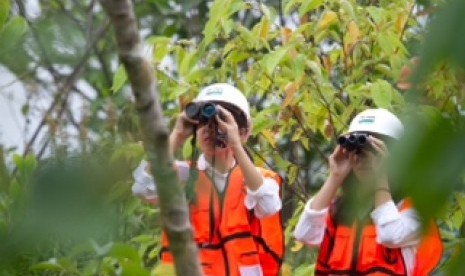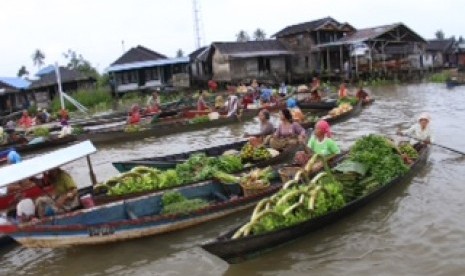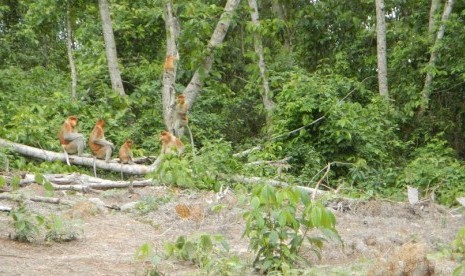REPUBLIKA.CO.ID, By. Giovanna Aanisa Thohir and Gabriella Alifa Thohir
Indonesia is filled with many unique animals that are endemic to the country. Orangutans and Komodo Dragons are renowned examples of such creatures. However there is another creature endemic to only a particular island in Indonesia, that have seemingly been forgotten, even by the Indonesians: MonyetBekantan, also known as the Proboscis Monkey. Unlike the Orangutan, which can be found in various locations in Kalimantan and Sumatra, the Proboscis monkey is endemic only to the Kalimantan Island. Proboscis Monkeys used to wander and roam through the mangrove forests of Kalimantan, however the diminishing loss of habitat has reduced their number to only thousands.
In Banjarmasin, the capital city of South Kalimantan, tourists can take a boat ride along the waters to visit the many islands scattered around Kalimantan. One of the islands along the route is PulauKaget. The locals know PulauKaget as an excellent monkey sighting area. It is guaranteed that tourists can sight monkeys thriving everywhere on the island. According to the locals, there is a profusion of monkeys living there; three species of monkeys that have made PulauKaget their habitat, the proboscis monkey, the common monkey as well as the Kalimantan lutung. The reason for this is because the coasts of PulauKaget are thick with mangrove trees. Proboscis Monkeys thrive in river areas with an abundance of trees. Areas with mangroves –such as those along the coasts of Southern Kalimantan- are ideal because the trees are dense and low to the water. Although they are adept swimmers, they still prefer the shelter of trees.

However upon arriving at the island, it became clear that it is impossible for monkeys to live in PulauKaget. The island is almost barren of trees. The trees left standing are those lining the perimeter of the island. A cheap attempt at trying to hide the flattened land that locals have made into rice paddies. Many of the islands along the route have been flattened as well. There were very little trees, and the monkeys that have previously flourished there are forced to find a new home. The waters that separate the islands are not shallow, many of them don’t survive the journey. Some, who have stayed in PulauKaget die from the lack of resources; others, who have made it to other islands barely survive. The trees are not thick enough to conceal them from dangers, and their food source is rapidly decreasing. For the Proboscis Monkey, he situation is not to their advantage. They are not compatible with common monkeys, so they are forced to fight for territory. Since there are greater numbers of common monkeys, the population of the Proboscis Monkey is rapidly decreasing.
Habitat loss, such as the one that happened to the PulauKaget Proboscis Monkeys is the most prominent cause for their decline. This issue is happening all over Kalimantan; Agriculture, Forestry and Urban development are rapidly reducing biodiversity. Indonesia is a big manufacturer of oils, wood and other resources essential to production. For this reason, agriculture and industrial projects are common throughout resource-producing areas of Indonesia, namely Kalimantan. However the effects on this on the wildlife whose habitat is located in Kalimantan did not go unnoticed. The numbers of Proboscis Monkeys in the last 5-10 years have dropped from being in the 20,000s to less than 7,000 left. Recent study shows that on May 16, 2013, there were 5,907 Proboscis monkey individuals left in the wild; the numbers are rapidly dropping.In 14 Years, it is predicted that the Proboscis Monkeys will be extinct.

During cultivation of resources, trees are cut down, or land is carved in order to get to the resources. For Proboscis Monkeys this means that the land and trees in their natural environment is decreasing. To make matters worse, Urban Development is also starting to remove any habitat they have left. The ideal habitat for Proboscis Monkeys is areas near a river with dense forestry and lots of ground coverage. However, because of habitat loss, they are forced to relocate to areas that are not ideal and adapt to whatever resources they can find, much like what happened with the Proboscis Monkeys in PulauKaget. Because of locals making settlements in PulauKaget, the monkeys have nowhere else to go, they are evicted from their natural habitat. Now, they are limited to only the remote areas of Kalimantan or small areas that still have dense trees, most that are not able to find a new home, die.
If they were to travel, they need the aid of trees. Although Proboscis Monkeys do unwind on the ground, they are not able to travel - on foot - across vast land spaces; therefore the only method of travel is by trees. However the declining number of trees limits the extent of their travels. This means that villagers can now find Proboscis Monkeys living in the most unnatural habitats. In the city of Banjarmasin, locals have found Proboscis Monkeys living next to an asylum. As horrible as it may be, there is no way they can relocate themselves. Their path is blocked by urban development, and even if they could go, who’s to say there are enough resources to sustain themselves? This in no way determines their safety though. The locals are known to kill Proboscis Monkeys as a sport and some are even eaten for medicine. The locals do not know that the mascot of their province is in such an endangered state.

Proboscis Monkeys are a symbol of our culture. It is a unique animal that is endemic to our country. However there has been no movement in the conservation of these endangered animals. Although they are as unique as orangutans and komodo, which has had a lot of media coverage, these poor creatures are left to survive on their own, while we tend to the necessities of our lives. Why are they important? Why should we help animals when we can’t even take care of ourselves? Why? Because in the future, when we do get our lives sorted out, we will not be able to see any of them. We have lost many species already to the actions of mankind. Should we sacrifice another, to suit our needs? It doesn’t take much to help. The first step is awareness.This article is the first step in the Bekantan Project to revive this dying population. Follow us as we attempt to save the Proboscis Monkeys of Indonesia.


